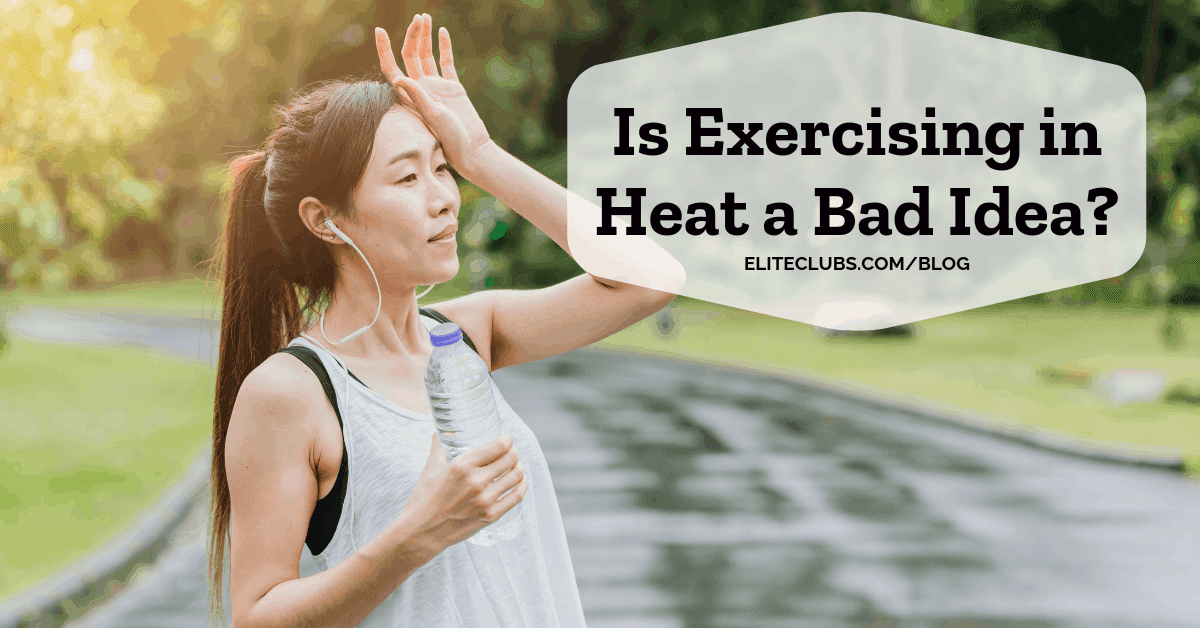
Exercising in extreme heat may be less effective than you think. High temperatures put a lot of stress on the body, and if you’re not careful, can lead to serious illness. This is probably the most immediately dangerous condition that you can be active in if you are not careful. Your body can and will make adaptations specific to heat but, you must take precautions. Here are some tips for exercising in heat.
Hydrate, Hydrate, Hydrate
Your primary strategy for hot weather success is hydration. Body weight (water) loss of 2% is safe and reasonable. When you hit 3% or more, dehydration has occurred. The key is not simply to pound water but to do it in the correct amounts (too much can be bad as well). As a general guide, most athletes under most conditions will be in the 20-25 oz. per hour range. If you are a heavier athlete or are in hotter conditions, you could be 28 oz. to slightly more per hour. In order to gauge this and help your body perform in these conditions, it is important to PRACTICE in the heat at an aerobic (conversational) pace for at least two to three weeks. Take the time to practice with water and electrolyte supplementation and note how much your bladder/bottles hold and when you will be able to refill. Drinking over 30 oz. of water per hour can be problematic and possibly even dangerous as it could lead to hyponatremia (low level of sodium in the blood).
Additional Tips to Stay Cool
To help stay cool and perform in the heat, here are some additional tips:
- Keep the head, trunk, and quadriceps cool/wet. Ice in bandanas and ice under hats can help.
- Take walk breaks as necessary if you are running. There were TONS of people ahead of me at my first Ironman WI (98 degrees). Unfortunately, I saw many of them lying on the side of the road in the marathon portion and the race had (at the time) the highest DNF rate of any Ironman. Slow down to stay healthy and finish.
- Wear light-colored clothing (not cotton).
- Drink cool/cold water to help with absorption.
- Understand that your digestion will slow down in the heat. Consume easily digestible calories and stay away from simple sugar-based sources that will become too concentrated in your gut and cause you to be sick.
- Caffeine can be a great performance aid but use it cautiously or not at all in the heat as it may cause heart rate to increase and make working in the heat even harder.
- Know the symptoms of over hydration/dehydration and stop if you feel lightheaded, sick, or get the chills.
Just because it is more difficult to exercise in heat doesn’t mean you shouldn’t do it, but you still need to be mindful of what can happen if your body gets too warm.
If you need a new exercise program or help getting fit, come see me for a FREE fitness consultation. We’ll go over your current habits and see where improvements can be made.
Set up a Free Fitness ConsultationWritten by Matt Bartz, Personal Training Director and Nutrition Coach at Elite Sports Club-River Glen
Matt has a Master of Science (M.S.), Kinesiology and Excercise Science degree and a Bachelor of Science (B.S.), Kinesiology and Exercise Science degree from the University of Wisconsin – Milwaukee. He is a certified Functional Strength Coach that specializes in functional resistance training for general health and all types of athletic endeavors. He enjoys running trail ultra-marathons, playing tennis, and spending time with his wife Jen and daughter Emma Carlin.
Matt started his career in 1997 and he joined the Elite team in 2012.
